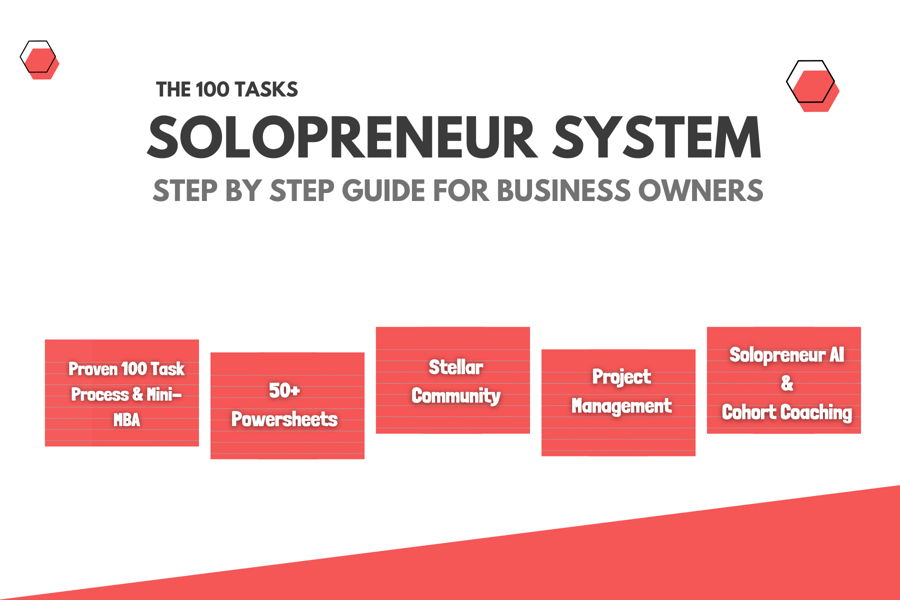Want to be a spiritual entrepreneur? Learn how to overcome common spiritual entrepreneur struggles to build a thriving, purpose-driven business.
When we think of entrepreneurship, we often consider hard work, innovation, and financial acumen as primary drivers of success. But what about the spiritual and less-talked-about traits that successful spiritual entrepreneurs and solopreneurs quietly cultivate?
For a spiritual entrepreneur, success goes beyond the tactical aspects of business and delves into deeper realms of personal growth, purpose, and balance. This article explores some often overlooked qualities that help spiritual solopreneurs overcome struggles and thrive in their journeys.
Contents
What is a Spiritual Entrepreneur?
A spiritual entrepreneur is an individual who integrates spiritual principles and practices into their business ventures. This type of entrepreneur prioritizes values such as authenticity, purpose, and service while seeking to create positive impacts in the world.
Unlike traditional entrepreneurs, spiritual entrepreneurs often focus on personal growth, mindfulness, and ethical practices to align their business objectives with their spiritual beliefs.
Here are some key characteristics of a spiritual entrepreneur:
- Purpose-Driven: They pursue a mission that resonates deeply with their values and beliefs, often aimed at helping others or addressing societal challenges.
- Mindfulness and Intuition: Spiritual entrepreneurs typically rely on mindfulness and intuition to guide their decision-making processes, trusting their instincts in business dealings.
- Community Focus: They emphasize building supportive communities and relationships, fostering collaboration over competition.
- Holistic Approach: They consider the well-being of all stakeholders, including employees, customers, and the environment, ensuring their business practices are sustainable and ethical.
- Personal Growth: Spiritual entrepreneurs view their business journey as a path for personal development, using challenges as opportunities for learning and self-discovery.
In summary, a spiritual entrepreneur combines entrepreneurial spirit with a commitment to spirituality, aiming to create a harmonious balance between business success and personal fulfillment.
10 Spiritual Entrepreneur Struggles
These spiritual entrepreneur struggles often go beyond the tactical aspects of running a business and delve into personal growth, purpose, and balance. Let’s explore some of these essential but often overlooked factors:
#1. Be willing to sacrifice toxic lifestyles
For spiritual entrepreneurs and solopreneurs, success often means making hard choices about how they live. Entrepreneurs committed to personal growth understand that their business will only flourish if they prioritize a healthier, more conscious lifestyle.
They must be willing to shed toxic habits like excessive partying, unhealthy eating, or indulgent lifestyles. Making these sacrifices and letting go of these distractions creates space for greater clarity, focus, and higher energy levels that can be invested in building a sustainable business.
Choosing to forgo late nights in favor of early mornings, or trading mindless activities for self-care practices that nourish the body and soul, like meditation or exercise, is no easy feat. Yet, those who succeed recognize that their business’s growth mirrors their personal growth.
Spiritual entrepreneurs and solopreneurs must practice spiritual self-care, embrace healthier habits, and understand that success requires a clear mind, a strong body, and a disciplined spirit.
Resources:
- Best Emotional Self-Care Tips For Writers & Creatives
- Spiritual Self-Care Ideas to Cultivate Inner Wellness
#2. Find your passion and sense of purpose
Entrepreneurship is not for the faint-hearted. The journey can be long and filled with unforeseen challenges. The way of the spiritual entrepreneur is rooted in passion and purpose.
This goes beyond financial motivation and taps into the deeper “why” behind their ventures. When aligned with a mission spiritual entrepreneurs genuinely care about, their work becomes a calling rather than just a job.
Having a clear “why” is essential. When spiritual entrepreneurs align their business with a cause they believe in, their work becomes more than a means to an end. It transforms into a fulfilling pursuit that energizes them through even the toughest times.
Spiritual entrepreneur struggles are easier to navigate with a clear sense of purpose driving their decisions. What sustains successful solopreneurs is often a deep connection to their passion and sense of purpose.
Passion provides the energy, while purpose provides the direction. Finding that alignment can be a process of introspection, but it is crucial to keep the flame alive when external rewards seem distant.
Resources:
- 22 Activities to Find Your Purpose in Life
- Purpose & Passion Finder Guide
- Awaken Your Passion & Purpose Certified Course
#3. Cultivate patience, consistency, and discipline
One of the most crucial entrepreneur characteristics is discipline. The spiritual entrepreneur understands that success isn’t immediate and requires patience and consistency.
Building a business is a marathon, not a sprint. It takes time to see results, and in the fast-paced world of entrepreneurship, patience can be an underrated but crucial asset. The ability to show up consistently, day after day, even when progress feels slow, differentiates those who thrive from those who falter.
This discipline keeps spiritual entrepreneurs focused on their long-term goals, showing up daily to work on their business, even when progress seems slow. Success in this realm is a journey, and those with the patience to persevere are the ones who succeed.
Consistency and discipline go hand in hand. Discipline ensures spiritual entrepreneurs and solopreneurs remain dedicated to their goals, sticking to routines and schedules even when motivation wanes.
Whether it’s posting regularly on social media, engaging with customers, or fine-tuning products and services, disciplined, steady efforts build momentum.
Spiritual entrepreneurs who embrace the long-term view understand that patience is part of the journey, and they trust the process, staying the course through the inevitable ups and downs.
Resources:
- 25 Entrepreneur Characteristics of Successful Business Owners
- The Way of the Spiritual Entrepreneur by Pauline Nguyen
#4. Embrace solitude and self-reflection
A core practice in becoming a spiritual entrepreneur is learning to value solitude. Many spiritual entrepreneurs thrive in solitude, using quiet moments to reflect on their goals, challenges, and personal growth.
Many spiritual entrepreneurs find quiet moments of reflection, meditation, and self-assessment essential for personal and professional growth. Solitude helps realign their business practices with their core values, creating space for inspiration and deeper spiritual connections.
Spiritual growth often occurs in these solitary moments. In a world filled with constant noise and distractions, silence and introspection allows for clearer thinking, better decision-making, and a deeper connection to one’s inner self.
Spiritual entrepreneurs who carve out time for reflection, meditation, or journaling can process their emotions and align their business goals with their values. Solitude is not a luxury but a necessity for maintaining balance, gaining perspective, and cultivating a clear vision for the future.
Resources:
#5. Learn resilience and emotional regulation
The journey of a spiritual entrepreneur is fraught with challenges, making resilience a vital trait for weathering the inevitable storms. This is not just about bouncing back after setbacks but maintaining faith in the vision, even when external circumstances seem bleak.
Spiritual resilience involves trusting the process, having faith that the universe (or your belief system) supports your goals, and staying grounded in the belief that you can overcome challenges.
Equally important is emotional self-regulation. It allows them to avoid making impulsive decisions and stay focused on goals in the long term. Spiritual entrepreneurs and solopreneurs often face high-pressure situations that can trigger stress or frustration.
Managing emotions and responding calmly to setbacks or obstacles is crucial for long-term success. Emotional self-regulation allows spiritual entrepreneurs and solopreneurs to stay focused, make clearer decisions, and avoid burnout, all while maintaining faith in themselves and the process.
Resources:
- Emotional Intelligence: Master Anxiety, Fear & Emotions
- Therapies for Healing Trauma: Recovering from Childhood Trauma
- How To Control Your Emotions, Be Resilient & Stay Calm Under Pressure
#6. Have gratitude, faith, and humility
Gratitude is a powerful force in the life of a spiritual entrepreneur. It transforms the entrepreneurial experience, turning challenges into opportunities for growth and learning.
No one achieves success alone, and staying open to feedback, advice, and mentorship helps avoid stagnation. Spiritual entrepreneurs and solopreneurs who approach their journey with humility and gratitude are more likely to stay grounded, even in success.
Practicing humility and celebrating small wins keeps them grounded, even as they face larger challenges. Faith whether derived from personal beliefs or a broader spiritual perspective, can provide grounding in difficult times.
These qualities foster a mindset that sees every struggle as an opportunity to learn and grow for entrepreneurs who wish to create meaningful, long-lasting ventures. Celebrating small wins and appreciating the journey fosters a positive mindset for long-term success.
Humility reminds spiritual entrepreneurs and solopreneurs that they are constantly learning and growing. Gratitude keeps the focus on the positive aspects of the journey, which in turn can help navigate the inevitable challenges with grace.
Resources:
#7. Trust your intuition and gut instincts
Data and analysis play a critical role in business, but many spiritual entrepreneurs and solopreneurs find that trusting their gut instincts is equally important.
Intuition is a powerful, often underappreciated asset for the spiritual entrepreneur. While facts and figures provide necessary insights, there are moments when the inner voice, that feeling in the gut, guides decision-making in a way that data cannot.
The way of the spiritual entrepreneur involves honing this intuitive ability, allowing them to make quick decisions that align with their vision and purpose. Trusting and honing your intuition can give you an edge in your business dealings.
Whether hiring the right team member, choosing business partners, or deciding on a product launch, those who tap into their intuitive side often find that it leads them down the right path.
Resources:
#8. Let go of fear and perfectionism
Fear of failure and perfectionism can cripple progress. Many spiritual entrepreneur struggles stem from the fear of failure or the pursuit of perfection. However, letting go of these forces is crucial for progress.
Instead of striving for flawless execution, successful spiritual entrepreneurs and solopreneurs focus on taking bold steps, learning from failures, and trusting that their path is unfolding as it should. They learn to let go of these paralyzing forces and embrace action over hesitation.
They understand that failure is often the best teacher and that striving for perfection can lead to missed opportunities. Instead, they aim for progress, staying flexible and open to change.
The entrepreneurial journey requires courage to take risks, face criticism, and enter the unknown. Letting go of fear and trusting in the process allows solopreneurs to act boldly and make the decisions necessary for growth.
Resources:
- Beat Fear and Anxiety Hypnosis Pack
- How to Stop Being Such a Perfectionist
- Be the Change You Want to See in the World
#9. Be willing to delegate and let go of control
While many spiritual entrepreneurs and solopreneurs pride themselves on doing everything independently, the spiritual entrepreneur knows when it’s time to let go and delegate tasks.
This willingness to trust others and release control allows them to focus on higher-level strategic efforts rather than getting bogged down in day-to-day tasks. Trust and humility play a big role here, fostering growth and expanding the reach of their business.
Many spiritual entrepreneurs and solopreneurs fall into the trap of believing they must handle every aspect of their business alone. While independence is often a driving force, learning to delegate is a vital skill for growth.
The willingness to let go of control allows spiritual entrepreneurs and solopreneurs to focus on high-level tasks and strategic decisions rather than getting bogged down in day-to-day operations. Delegating tasks requires trust and humility.
Spiritual entrepreneurs and solopreneurs must admit that they can’t — and shouldn’t — do everything themselves. By delegating to others, whether through hiring freelancers, using automation tools, or outsourcing specific tasks, they free up time and mental space to scale their business and work on long-term goals.
Letting go of control doesn’t mean losing ownership; it means making space for growth and allowing others to contribute their strengths to their entrepreneurial success.
Resources:
- How To Outsource Work Effectively
- How to Outsource SEO Services to an SEO Specialist
- How to Hire Growth Hackers for Rapid Business Expansion
#10. Cultivate an abundance mindset
A key spiritual quality for solopreneurs is adopting an abundance mindset — believing that opportunities, resources, and success are limitless. A spiritual entrepreneur doesn’t fall into the trap of competition or scarcity but instead believes there’s enough success for everyone.
Whether seeking out spiritual entrepreneur ideas or navigating difficult decisions, this mindset allows for openness, generosity, and innovation in their approach to business.
Spiritual entrepreneurs who cultivate an abundance mindset see challenges as stepping stones rather than barriers, knowing that every failure brings them closer to success. Instead of focusing on scarcity or competition, they trust that there’s enough success for everyone.
This mindset allows spiritual entrepreneurs and solopreneurs to approach decisions with confidence and generosity, fostering collaborations rather than fearing competition, staying open to the infinite possibilities around them, and welcoming growth from unexpected sources.
An abundance mindset nurtures resilience and innovation, enabling entrepreneurs to embrace change and welcome new opportunities for navigating the uncertainties of entrepreneurship. You can learn how to reframe limiting beliefs that create a scarcity mindset to empowering beliefs that support an abundance mindset.
Listening to a spiritual entrepreneur podcast or engaging with a spiritual entrepreneur online community can help you cultivate an abundance mindset and reinforce the idea that success is limitless.
Resources:
- Free Abundance Courses to Manifest Monetary Abundance
- How To Reframe Limiting Beliefs from Scarcity to Abundance
- How To Use The Law Of Attraction For Business Success
3 Inspiring Spiritual Entrepreneur Examples
Here are some inspiring examples of spiritual entrepreneurs who successfully blended their spiritual beliefs with their business ventures to create meaningful impact.
#1. Mary Morrissey
Mary Morrissey is a prominent example of a spiritual entrepreneur who exemplifies integrating spiritual principles into business.
As a renowned speaker, author, and dream-builder coach, she emphasizes the power of personal transformation and the importance of aligning one’s purpose with business endeavors.
Mary’s work focuses on empowering individuals to tap into their potential and manifest their dreams, showcasing how spiritual entrepreneurs can inspire positive change in the lives of others.
Here are some of her free resources:
- Free Ignited-Self Vision Board Kit
- Free Manifestation Meditation
- Free Manifestation Masterclass
- Mary Morrissey’s Best Day Guidebook
By blending spirituality with practical business strategies, she illustrates the profound impact a purpose-driven approach can have in creating meaningful, lasting success.
#2. Jack Canfield
Jack Canfield is another influential example of a spiritual entrepreneur known for his work as a motivational speaker, author, and success coach.
Best recognized as Co-creator of the Chicken Soup for the Soul book series, Canfield emphasizes the power of positive thinking, personal responsibility, and the law of attraction in achieving success.
His teachings integrate spiritual principles with practical strategies, guiding individuals to tap into their inner potential and transform their lives.
Through workshops, seminars, and coaching programs, Jack Canfield inspires countless people to set and achieve ambitious goals through personal growth and self-awareness.
Here are some of his free resources:
- Free Success Formula Webcast
- Free Webcast: Transform Your Life & Career
- How to Overcome Negative Thoughts and Feelings
Jack Canfield’s work exemplifies how spiritual entrepreneurs can merge passion with purpose, fostering a community centered around empowerment, resilience, and fulfillment.
#3. Brad Yates
Renowned EFT (Emotional Freedom Techniques) coach, Brad Yates, is an expert in tapping, combining psychological principles with energy healing to help individuals overcome emotional and physical challenges.
With over two decades of experience, Yates has empowered countless clients through his innovative approach to personal development. He emphasizes the importance of healing limiting beliefs and emotional blocks using EFT to facilitate profound mindset and well-being shifts.
Brad Yates is also known for his engaging workshops, online courses, and videos where he shares tapping techniques that promote healing, stress relief, and self-empowerment. His practical, approachable style resonates with many, making tapping accessible to a broad audience.
The page below features his free EFT resources:
As a spiritual entrepreneur, Brad Yates exemplifies how integrating spirituality with practical techniques can lead to transformative outcomes, fostering personal growth and holistic healing for his clients.
Success in entrepreneurship requires more than just strategy and execution. It demands personal evolution, a commitment to growth, and the cultivation of spiritual qualities that often go unspoken.
The journey of the spiritual entrepreneur is one of growth, learning, and alignment with a deeper purpose. Whether overcoming personal struggles or business challenges, these solopreneurs thrive by cultivating patience, intuition, discipline, and an abundance mindset.
By embracing these spiritual qualities, they build stronger businesses, create a more fulfilling and meaningful entrepreneurial journey, and lead more fulfilling lives, aligned with their values and vision.
Entrepreneur Tips & Tutorials
- How To Become an Entrepreneur
- 52 Critical Business Skills For Success
- How to Scale and Grow Your Solopreneur Business
- Best Business Courses to Learn Entrepreneur Skills
- 25 Successful & Famous Entrepreneur Examples
- 25 Entrepreneur Characteristics Of Successful Business Owners
- 7 Steps To Go From Employee To Entrepreneur Mindset
Click here to get the 100 Tasks Solopreneur Course
© 2024, Priya Florence Shah. All rights reserved.
Priya Florence Shah is a bestselling author and an award-winning blogger. Check out her book on emotional self-care for women. Priya writes short stories and poetry and chills with her two-legged and four-legged kids in her spare time.
Discover more from Business & Branding Tips
Subscribe to get the latest posts sent to your email.



















